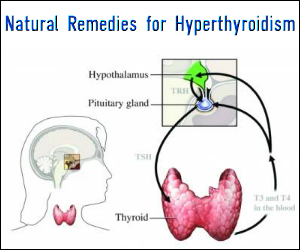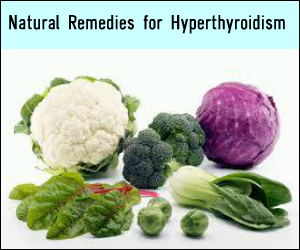Tips for Helping Hyperthyroidism!

Firstly get a blood test done! Check your Vitamin D level, free t4, tsh, testosterone,progesterone,check for food allergies, check for Graves disease, pituitary gland problems and maybe check your iodine levels.
The most common food allergens to avoid include gluten containing grains such as :
Also Other allergens Problems are:
Obviously all processed and man-made foods need to be avoided at all costs.
Other common allergens include those of the nightshade family such as:
Anyone with auto-immune reactions or excessive inflammation should get tested for food allergies or try an elimination diet to see if the conditions improve.
Great anti-inflammatory foods which help Overactive Thyroid include:
The Non-dematured,Whey protein source from grass fed cows and goats are also loaded with L-glutamine and enhances cellular glutathione stores which are both necessary for rebuilding the gut and de-inflaming the body.
Anti-inflammatory herbs such as:

Certain foods such as cruciferous vegetables like:
Vitamin D deficiencies are a common day epidemic. Vitamin D helps coordinate the immune response by allowing the body to recognize between foreign and self proteins. This reduces inflammation and auto-immune reactions. A healthy range for vitamin D3 (25-hydroxy cholcalciferol) is between 60-100 ng/ml which is much higher than the medically acceptable 32 ng/ml. Be sure to know your levels and get them over 60 ng/ml. Spend 20-30 minutes a day in the sun or supplement with 10,000-50,000 IU of high quality emulsified vitamin D3 for a period of time until you reach the desired levels. Keep track of your levels of vitamin D through bloodwork, you don't want too low vit D, but also not too high vit D either.
Other factors that dramatically affect the immune system and thyroid gland include environmental toxicity.
This could be in the form of heavy metals, overexposure to:

Firstly get a blood test done! Check your Vitamin D level, free t4, tsh, testosterone,progesterone,check for food allergies, check for Graves disease, pituitary gland problems and maybe check your iodine levels.
- The most common causes for hyperthyroidism are a chronically inflamed thyroid (thyroiditis) and an autoimmune condition called Graves Disease. Both inflammatory and auto-immune disorders are caused by an over-active and under-coordinated immune system.
- Several key factors such as intestinal dysbiosis, common food & environmental allergens, nutritional habits, vitamin D levels, & heavy metal toxicity must be addressed with any inflammatory and auto-immune disorder and should be checked for.
The most common food allergens to avoid include gluten containing grains such as :
- wheat
- barley
- rye
- oats
- kamut
- & spelt
Also Other allergens Problems are:
- Soy products
- different nuts
- eggs
- and heavy proteins are often not tolerated well.
Obviously all processed and man-made foods need to be avoided at all costs.
Other common allergens include those of the nightshade family such as:
- eggplant
- tomatoes
- & onions
Anyone with auto-immune reactions or excessive inflammation should get tested for food allergies or try an elimination diet to see if the conditions improve.
- An anti-inflammatory diet and lifestyle are critical for full recovery from these conditions. Anti-inflammatory foods help to modulate the immune system giving it a more accurate pair of eyes so as to not over-inflame when stimulated. To effectively de-inflame, it is key to completely avoid man-made foods, sugars, and food allergens as listed above. The long chain omega 3 fatty acids EPA and DHA powerfully de-inflame the body by restoring natural balance to the lipid wall of the cell membrane. So getting those omega 3 fatty acids are recommended to help any inflammation you have.
Great anti-inflammatory foods which help Overactive Thyroid include:
- coconut products
- berries
- and non-denatured, whey protein from grass-fed cows and goats.
Anti-inflammatory herbs such as:
- tumeric
- ginger
- cinnamon
- rosemary
- & oregano among others should be used as much as possible.
Goitrogens block thyroid hormone production and thus help to slow down the thyroid. Therefore anyone suffering from Hyperactive Thyroid would benefit greatly from eating raw cruciferous veggies.

- broccoli
- cabbage
- & kale among others contain goitrogens in their raw state.
Vitamin D deficiencies are a common day epidemic. Vitamin D helps coordinate the immune response by allowing the body to recognize between foreign and self proteins. This reduces inflammation and auto-immune reactions. A healthy range for vitamin D3 (25-hydroxy cholcalciferol) is between 60-100 ng/ml which is much higher than the medically acceptable 32 ng/ml. Be sure to know your levels and get them over 60 ng/ml. Spend 20-30 minutes a day in the sun or supplement with 10,000-50,000 IU of high quality emulsified vitamin D3 for a period of time until you reach the desired levels. Keep track of your levels of vitamin D through bloodwork, you don't want too low vit D, but also not too high vit D either.
Other factors that dramatically affect the immune system and thyroid gland include environmental toxicity.
This could be in the form of heavy metals, overexposure to:
- pesticides
- herbicides
- household molds
- personal hygiene products
- household cleaning agents
- tap water
- non-stick coated pans, and others.
Overview:
- eat cruneferious vegetables
- Avoid enviromental toxins as much as possible by buying organic foods,cosmetics and cleaning supplies, drink filtered water and cook in pfoa free pans.
- Make sure your house is free of mold and if not possible to fully remove the mold get an air purifier in rooms you are in most, especially your bedroom. And put a dehumidifier in your basement to help keep moisture undercontrol to help limit mold growth.
- Make sure your vitamin D is Normal.
- Eat an anti-inflamatory diet.
- Get a food allergy test and avoid those foods.
- Get a good amount of Omega 3's in your diet.
- Avoid Processed foods!



